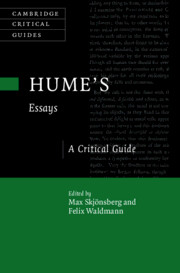Book contents
- Hume’s Essays
- Cambridge Critical Guides
- Hume’s Essays
- Copyright page
- Dedication
- Contents
- Figures
- Contributors
- Acknowledgements
- Abbreviations
- Introduction
- Part I Reception
- Part II Philosophy
- Part III Politics
- Part IV Political Economy
- Chapter 11 Hume and Population
- Chapter 12 Hume on Economic Inequality
- Chapter 13 Hume and the Politics of Money
- Bibliography
- Index
- Cambridge Critical Guides
Chapter 13 - Hume and the Politics of Money
from Part IV - Political Economy
Published online by Cambridge University Press: 02 January 2025
- Hume’s Essays
- Cambridge Critical Guides
- Hume’s Essays
- Copyright page
- Dedication
- Contents
- Figures
- Contributors
- Acknowledgements
- Abbreviations
- Introduction
- Part I Reception
- Part II Philosophy
- Part III Politics
- Part IV Political Economy
- Chapter 11 Hume and Population
- Chapter 12 Hume on Economic Inequality
- Chapter 13 Hume and the Politics of Money
- Bibliography
- Index
- Cambridge Critical Guides
Summary
This contribution surveys the essays in political economy that Hume began to publish in 1752, with particular attention to his thinking about money. The essays are presented as, in part, extensions of the natural history of property and government that Hume began to sketch in A Treatise of Human Nature. But they were also carefully calibrated interventions in the political discourse of trade and finance prominent in British politics since the seventeenth century. Hume’s political economy can be situated in a range of British and European intellectual and political contexts. This chapter pays particular attention to his recurrent engagement with John Locke’s extensive writings on money, trade and taxation, which served Hume as a foil in developing his own positions. There is, it will be suggested, a deep connection between Hume’s celebrated critique of Locke’s account of the original contract and his rejection of Locke’s search for an invariable monetary standard.
Keywords
- Type
- Chapter
- Information
- Hume's EssaysA Critical Guide, pp. 247 - 262Publisher: Cambridge University PressPrint publication year: 2025

